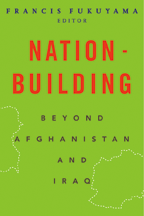 A new book on nation-building edited by Francis Fukuyama is coming out later this month. This volume includes essays by Larry Diamond and Minxin Pei, among others. A lot of work in post-conflict reconstruction concentrates on immediate physical rebuilding of countries (roads, buildings, etc.) and establishing security, but, although these are important elements in their own right, more attention should be paid to institutional reconstruction, which sets up economies on a path of sustainable growth. This becomes even more important after aid flows dry up. Bosnia, where billions of aid dollars essentially failed to address the country’s institutional deficiencies, is a case in point. For more on the reconstruction process in Bosnia see this excellent article by Sanja Omanovic.
A new book on nation-building edited by Francis Fukuyama is coming out later this month. This volume includes essays by Larry Diamond and Minxin Pei, among others. A lot of work in post-conflict reconstruction concentrates on immediate physical rebuilding of countries (roads, buildings, etc.) and establishing security, but, although these are important elements in their own right, more attention should be paid to institutional reconstruction, which sets up economies on a path of sustainable growth. This becomes even more important after aid flows dry up. Bosnia, where billions of aid dollars essentially failed to address the country’s institutional deficiencies, is a case in point. For more on the reconstruction process in Bosnia see this excellent article by Sanja Omanovic.
What Bosnia showed us is that to create functioning states reformers must also create functioning economies. And we continue to see the importance of having a functional economic system in place in Iraq, Afghanistan, Kosovo, Haiti, Sierra Leone, and other post-conflict environments today. When we talk about freedoms (freedom of press, access to information, participation in the political process, access to policymakers, and protection of property rights) we must recognize that political freedoms are inseparable from economic freedoms, and, therefore, countries striving to build democracies must also concentrate on building market economies. But the toughest task, perhaps, is finding the right balance between addressing the immediate needs of societies in post-conflict settings (which certainly can’t be ignored) and carrying out long-term institution-building strategy (which absolutely must be implemented). I hope the book will address this problem.
While you wait for the book, you can check out last year’s CIPE’s interview with Fukuyama where he discussed nation-building in Afghanistan and Iraq.
Published Date: January 03, 2006
